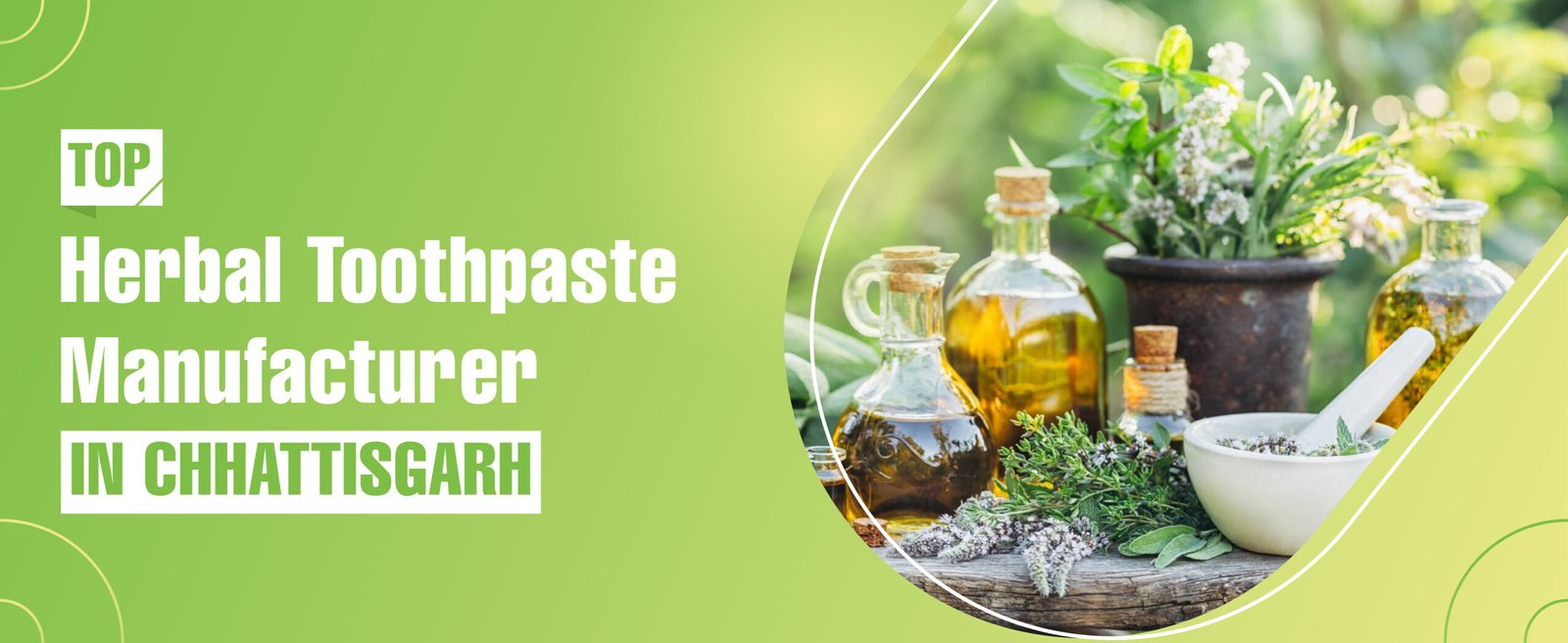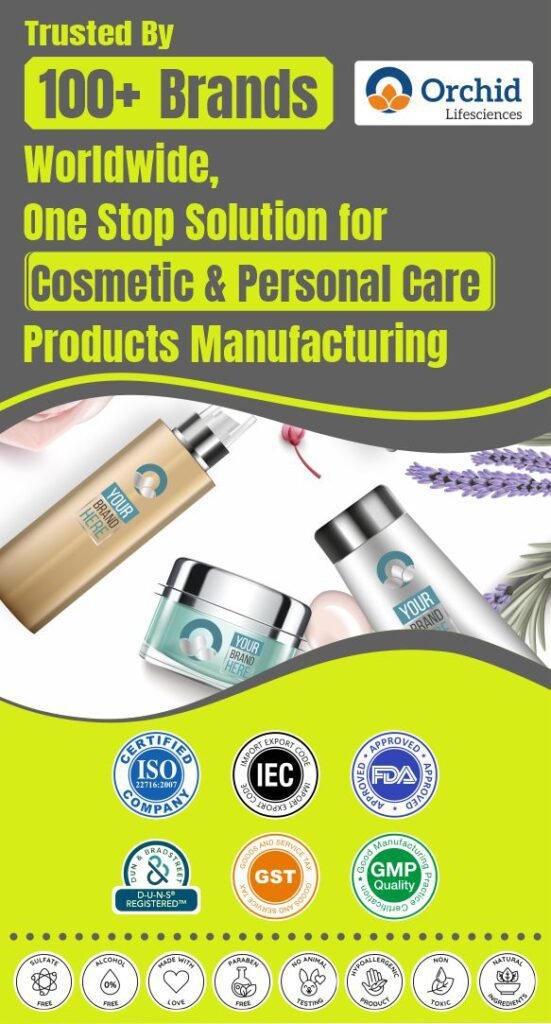In the rapidly growing market of herbal toothpaste, Orchid Lifesciences has established itself as a leading manufacturer in Chhattisgarh, particularly in Nagar. Specializing in third-party manufacturing, Orchid Lifesciences offers a wide range of herbal toothpaste products that combine the benefits of natural ingredients with advanced formulation techniques.
Their commitment to quality and innovation has made them a trusted partner for brands looking to enter the herbal oral care market.
By leveraging its expertise in herbal products and state-of-the-art manufacturing facilities, Orchid Lifesciences delivers effective, safe, and environmentally friendly toothpaste solutions that meet the diverse needs of consumers across Chhattisgarh and beyond.
Key Herbal Toothpaste Manufacturer in Chhattisgarh
Several companies have established their presence in Chhattisgarh’s herbal toothpaste manufacturing sector. Some of the prominent ones include:
1. Orchid Lifesciences
Orchid Lifesciences is a leading manufacturer specializing in a wide range of herbal personal care products, including toothpaste. Established in Raipur, the company’s mission is to provide effective and affordable oral care solutions derived from nature. Their flagship product, Orchid’s toothpaste combines the goodness of neem, clove, and mint to ensure complete oral hygiene.
They now have manufacturing capabilities for catering to various batch sizes, ranging from 25 kgs to 2000 kgs per batch. Their filling capacity for tubes has expanded from 25 Lakh to 55 Lakh per month, Bottle filling capacity from 5 Lakh to 15 Lakh per month, and jars from 5 Lakh to 12 Lakh per month. They also introduced new pouch packaging machines with a monthly filling capacity of 55 Lakh pouches.
Orchid Lifesciences is certified by many reputable associations like WHO- GMP facility, ISO 22716 certified, DUNS registered, GST Compliant, and approved by the FDA (Food and Drug Administration). Which makes them a popular choice not only in India but also in countries across the globe. This assures that each & every product Manufactured at Orchid Lifesciences is 100% safe to use and is effective as well.
Address:
Plot No. 68-72, Tribhuvan Industrial Estate, Road No.11, Nr. Kathwada GIDC, Kathwada, Ahmedabad, Gujarat-382430
Contact:
+91-8980815444
+91-9898026828
+91-9922840985
Email – marketing@orchidlifesciences.com
Website:
https://orchidlifesciences.com/
2. GreenLeaf Herbals
Based in Bilaspur, GreenLeaf Herbals is known for its commitment to quality and sustainability. The company sources its raw materials from local farmers practising organic farming methods. Their product portfolio includes herbal toothpaste and tooth powders formulated using traditional Ayurvedic recipes. GreenLeaf’s products are certified by various national and international quality standards organizations.
3. Nature’s Smile Enterprises
Nature’s Smile Enterprises operates from Durg and focuses on integrating modern scientific techniques with traditional knowledge to produce high-quality herbal toothpaste. Their products are enriched with natural ingredients like babool, tulsi, and meswak, known for their therapeutic properties. The company has a strong distribution network across India and is exploring export opportunities in Southeast Asia and Europe.
The Herbal Toothpaste Manufacturing Industry in India
1. Growth and Demand for Herbal Products
The Indian herbal toothpaste market has witnessed robust growth over the past decade. Factors such as increasing health consciousness, awareness about the harmful effects of chemical-based products, and a resurgence of interest in traditional Ayurvedic remedies have fueled this growth.
According to industry reports, the herbal toothpaste segment in India is expected to grow at a CAGR of 7-8% over the next five years, outpacing the overall toothpaste market growth.
2. Shift Towards Natural and Organic Oral Care
Consumers are increasingly opting for natural and organic oral care products that are free from synthetic chemicals like fluoride, triclosan, and artificial sweeteners. Herbal toothpaste, formulated with natural ingredients such as neem, clove, basil, and mint, offer effective oral hygiene solutions while minimizing potential side effects.
This shift towards natural products is not just a trend but a sustained movement driven by increased access to information and a desire for holistic well-being.
Key Players and Regional Hotspots in India
Several established companies dominate the Indian herbal toothpaste market, including Orchid Lifesciences, Dabur, Patanjali, Himalaya, and Vicco. These brands have leveraged India’s rich Ayurvedic knowledge and abundant natural resources to create effective and affordable products.
Regional hotspots for herbal toothpaste manufacturing include states like Uttarakhand, Himachal Pradesh, Kerala, and more recently, Chhattisgarh.
Chhattisgarh: A Rising Hub for Herbal Products
1. Overview of Chhattisgarh’s Industrial Landscape
Chhattisgarh, located in central India, is endowed with rich biodiversity and a wealth of medicinal plants. The state’s economy is primarily driven by agriculture, forestry, and mining.
However, in recent years, there has been a concerted effort to diversify the industrial base, focusing on herbal and Ayurvedic products. The availability of raw materials, skilled labour, and supportive government policies have positioned Chhattisgarh as an emerging centre for herbal product manufacturing.
2. Government Initiatives and Support for Herbal Manufacturing
The government of Chhattisgarh has implemented several initiatives to promote the herbal industry. These include the establishment of herbal parks, the provision of subsidies and tax incentives for manufacturers, and the development of infrastructure to support processing and export.
The Chhattisgarh State Medicinal Plant Board (CSMPB) plays a crucial role in conserving medicinal plant resources and supporting sustainable harvesting practices. Additionally, the government has launched training programs to educate farmers and entrepreneurs about the cultivation and processing of medicinal plants.
3. Potential and Opportunities in the Herbal Toothpaste Market
Chhattisgarh’s strategic location, coupled with its rich natural resources, presents significant opportunities for growth in the herbal toothpaste market. The state’s proximity to major markets in central and eastern India reduces distribution costs and enhances market reach.
Furthermore, the increasing global demand for natural and organic products opens up export opportunities. With continued investment in research and development, infrastructure, and marketing, Chhattisgarh has the potential to become a leading player in the herbal oral care industry.
4. Manufacturing Practices and Standards
These manufacturers adhere to strict quality control measures to ensure the efficacy and safety of their products. They follow Good Manufacturing Practices (GMP) and have certifications from relevant authorities such as the Food Safety and Standards Authority of India (FSSAI) and the Ministry of AYUSH. Many companies also pursue ISO certifications to enhance their credibility in international markets.
5. Unique Selling Propositions (USPs) and Product Range
The USPs of these manufacturers lie in their use of locally sourced, high-quality natural ingredients, and adherence to traditional Ayurvedic formulations. Their product ranges cater to various consumer needs, including sensitivity relief, whitening, gum care, and cavity protection. Additionally, they offer products in different forms such as gels, pastes, and powders, and in various packaging sizes to cater to diverse market segments.
Ingredients Used in Herbal Toothpaste
1. Common Herbs and Their Benefits
Herbal toothpaste manufacturers in Chhattisgarh utilize a variety of medicinal plants known for their oral health benefits. Some of the common ingredients include:
- Neem: Possesses strong antibacterial properties that help prevent cavities and gum diseases.
- Clove: Contains eugenol, which has analgesic and antiseptic properties, providing relief from toothaches.
- Basil (Tulsi): Acts as an antibacterial agent and helps in maintaining fresh breath.
- Babool: Strengthens gums and teeth due to its astringent properties.
- Meswak: Known for its anti-inflammatory and antibacterial effects, it helps in reducing plaque and preventing tooth decay.
- Mint: Provides a refreshing flavour and aids in combating bad breath.
2. Sourcing and Sustainability of Raw Materials in Chhattisgarh
Manufacturers prioritize sustainable sourcing practices to ensure the long-term availability of medicinal plants. They collaborate with local farmers and tribal communities for the cultivation and collection of herbs, providing them with a stable income and promoting community development. Additionally, efforts are made to cultivate these plants in controlled environments to reduce the pressure on wild resources and maintain ecological balance.
3. Innovation in Herbal Toothpaste Formulations
Research and development play a crucial role in innovating new formulations that enhance the effectiveness of herbal toothpaste. Manufacturers are experimenting with novel combinations of herbs and incorporating natural minerals like calcium and fluoride derived from plant sources. Some are also introducing probiotic ingredients to promote a healthy oral microbiome. Flavor innovations, such as the inclusion of fruit extracts, are being explored to make the products more appealing to children.
Manufacturing Process
1. Overview of the Herbal Toothpaste Manufacturing Process
The manufacturing process of herbal toothpaste involves several key steps:
- Ingredient Preparation: Selection and procurement of high-quality herbs and other natural ingredients. These are then cleaned, dried, and ground into fine powders or extracted into essential oils.
- Formulation: The prepared ingredients are carefully measured and mixed according to specific formulations to achieve the desired consistency and therapeutic properties.
- Homogenization: The mixture is homogenized to ensure a uniform blend, eliminating any lumps or inconsistencies.
- Quality Testing: Samples from the batch are tested for quality parameters such as pH, viscosity, and microbial contamination.
- Filling and Packaging: The finished toothpaste is filled into tubes or containers using automated machinery, followed by labeling and packaging.
- Storage and Distribution: The products are stored in controlled environments before being dispatched to distributors and retailers.
2. Quality Control Measures and Certifications
Manufacturers implement rigorous quality control measures at every stage of production. This includes raw material testing, in-process checks, and final product evaluation. They employ advanced analytical techniques such as High-Performance Liquid Chromatography (HPLC) and microbiological assays to ensure product safety and efficacy. Certifications from bodies like FSSAI, AYUSH, and ISO enhance consumer trust and facilitate market access.
3. Role of Technology in Enhancing Production Efficiency
The integration of modern technology in manufacturing processes has significantly improved production efficiency and product quality. Automation in mixing, filling, and packaging reduces human error and increases output. Advanced monitoring systems ensure real-time quality checks and process optimization. Additionally, the use of software solutions for inventory management and supply chain logistics streamlines operations and reduces costs.
Market Trends and Consumer Preferences
1. Growing Demand for Herbal and Natural Products
The global trend towards natural and organic products is strongly reflected in the Indian market. Consumers are increasingly aware of the health risks associated with chemical-based products and are actively seeking natural alternatives. This has led to a surge in demand for herbal toothpaste, which is perceived as safer and more effective in maintaining oral health.
2. Consumer Awareness and Preferences in Chhattisgarh
In Chhattisgarh, rising literacy rates and increased access to information have made consumers more conscious about their oral health choices. There is a growing preference for products that offer therapeutic benefits without adverse effects. Local manufacturers are leveraging this trend by educating consumers about the benefits of herbal ingredients through targeted marketing campaigns and community outreach programs.
3. Impact of E-commerce and Digital Marketing
The proliferation of e-commerce platforms has significantly expanded the market reach of herbal toothpaste manufacturers in Chhattisgarh. Online marketplaces like Amazon, Flipkart, and specialized health product sites provide access to a wider consumer base across India and internationally. Digital marketing strategies, including social media advertising and influencer partnerships, are effectively used to increase brand visibility and engage with consumers directly.
Challenges and Opportunities
1. Regulatory Challenges and Compliance Issues
Manufacturers face stringent regulatory requirements concerning product safety, labeling, and advertising claims. Navigating the complex approval processes and maintaining compliance with multiple regulatory bodies can be challenging, especially for small and medium-sized enterprises. However, adherence to these regulations is essential to ensure consumer safety and build brand credibility.
2. Competition with Established Brands
Competing with well-established national and international brands poses a significant challenge for local manufacturers. These brands have substantial marketing budgets and widespread distribution networks. To overcome this, manufacturers in Chhattisgarh focus on product differentiation through unique formulations, quality assurance, and competitive pricing.
3. Opportunities for Growth and Expansion
Despite the challenges, there are ample opportunities for growth in the herbal toothpaste market. Increasing consumer demand, supportive government policies, and access to global markets through e-commerce present favorable conditions for expansion. Investing in research and development, enhancing production capacities, and exploring export opportunities can help manufacturers scale their operations and increase profitability.
Sustainability and Environmental Impact
1. Eco-friendly Practices in Herbal Toothpaste Manufacturing
Manufacturers in Chhattisgarh are increasingly adopting eco-friendly practices to minimize their environmental footprint. This includes using renewable energy sources, implementing waste reduction strategies, and adopting biodegradable packaging materials. Sustainable sourcing of raw materials ensures the preservation of biodiversity and supports local ecosystems.
2. Role of Herbal Toothpaste Manufacturers in Promoting Sustainability
By producing natural and biodegradable products, herbal toothpaste manufacturers contribute to reducing chemical pollution and promoting environmental sustainability. Engaging in community development initiatives, such as supporting organic farming and providing employment opportunities, further enhances their positive social impact.
Future Outlook
1. Predictions for the Herbal Toothpaste Market in Chhattisgarh
The herbal toothpaste market in Chhattisgarh is poised for significant growth in the coming years. Increasing health awareness, supportive government policies, and the global shift towards natural products are key drivers of this growth. Market analysts predict that Chhattisgarh could capture a substantial share of the national herbal toothpaste market, with potential for significant exports.
2. Emerging Trends and Innovations
Future trends in the industry include the development of personalized oral care solutions, incorporation of probiotics and enzymes into formulations, and the use of innovative packaging solutions that enhance product shelf-life and user convenience. Embracing digital technologies such as AI and machine learning can further optimize manufacturing processes and supply chain management.
3. Strategic Recommendations for Manufacturers
To capitalize on future opportunities, manufacturers should:
- Invest in R&D: Developing innovative and effective formulations can provide a competitive edge.
- Enhance Quality Standards: Obtaining international certifications can facilitate entry into global markets.
- Expand Distribution Networks: Leveraging both traditional and digital channels can increase market reach.
- Engage in Sustainable Practices: Adopting eco-friendly manufacturing processes and supporting community development can enhance brand image and consumer trust.
- Collaborate with Stakeholders: Partnering with government bodies, research institutions, and other industry players can foster growth and innovation.
Conclusion
Chhattisgarh’s emergence as a significant player in the herbal toothpaste manufacturing industry is a testament to its rich natural resources, strategic initiatives, and the entrepreneurial spirit of its people. The state’s manufacturers are well-positioned to meet the growing demand for natural and effective oral care solutions, both domestically and internationally. By continuing to innovate, adhere to quality standards, and embrace sustainable practices, Chhattisgarh can solidify its position as a leading hub for herbal toothpaste production, contributing to improved oral health and well-being on a global scale.







